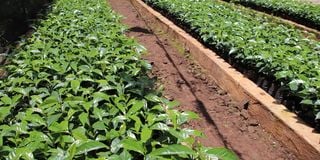Natembeya moots plans to increase coffee production in Trans Nzoia

A coffee nursery bed at Muroki Coffee Farmers Cooperative Society in Saboti sub-county, Trans Nzoia county. On International Coffee Day 2022 celebrations on October 1, 2022, Governor George Natembeya said his administration is committed to increasing production of the crop in the county.
What you need to know:
- Trans Nzoia governor terms it illogical for Trans Nzoia to be ranked among counties with low coffee production, saying it has a great potential
- The governor cites lack of proper regulations that he said had given room for middlemen to exploit hardworking farmers, resulting in a decline in production of the crop that was once Kenya’s leading foreign exchange earners
Trans Nzoia Governor George Natembeya wants to increase coffee cultivation, noting that the county has great unexploited potential.
Mr Natembeya’s administration plans to increase land under coffee from the current 2,535ha to 10,000ha by 2023.
Marking International Coffee Day on Saturday, October 1, the governor said this will increase farmers’ income.
Speaking at the Muroki Coffee Farmers Cooperative Society offices in Saboti sub-county, the governor lamented low coffee production in the county.
"It is indeed illogical for a county like Trans Nzoia to be ranked among counties with low coffee production when we have all the potential. We must all strive to return this county to where it should be," he said.
He promised to ask the national government to increase subsidies for fertiliser and other farm inputs, urging farmers to diversify the crops they grow.

Trans Nzoia Governor George Natembeya (right) with county Agriculture, Cooperatives and Livestock CEC Mrs Mary Nzomo, (centre) at Muroki Coffee Farmers Cooperative Society in Saboti during the International Coffee Day 2022 celebrations on October 1, 2022.
Barriers to production
Mr Natembeya called for the removal of barriers hindering coffee farmers from reaping maximum profits from the cash crop.
Among others, he cited lack of proper regulations that he said had given room for middlemen to exploit hardworking farmers, resulting in a decline in production of the crop that was once Kenya’s leading foreign exchange earners.
"My administration is committed to training farmers in best farming practices and sustainability, as well as capacity building to transform them into agripreneurs," he said.
Agriculture, Cooperatives and Livestock executive Mary Nzomo said her department is helping farmers diversify the crops they grow so as to mitigate the risks of overdependence on maize production. The county government is promoting tissue culture bananas, coffee, tea, avocados, macadamia and apples.
"Farmers are facing low production and productivity, inadequate value addition, high cost of production, narrow markets, negative climate change impacts and inadequate affordable credit and infrastructure and that's why the county government is moving with speed to address the issues," Mrs Nzomo said.
Wrangles
She also regretted wrangles among members of cooperative societies, saying these had hampered productivity.
She challenged residents to buy locally manufactured coffee products, saying this would boost the livelihoods of residents.
Agriculture Chief Officer Robert Musikoyo challenged coffee farmers to take advantage of the Coffee Farm Inputs Stimulus Package E-Subsidy Programme.
"The subsidy programme will allow coffee farmers to access a wide range of inputs of their choice at the required time, and at the nearest input supplier through an e-voucher system," he said.
Newly elected Kenya Planters Cooperative Union Director Gloria Wamalwa said the union had revived warehouses all over the country to boost coffee production.
"The board will ensure that farmers benefit from the coffee subsidy," she said.
Production volumes
Last season, Kenyan farmers produced over 36,000 metric tonnes of coffee, which earned the country Sh17.4 billion, with Trans Nzoia producing about 749 tonnes valued at Sh215 million.
This was an improvement from 658 tonnes of clean coffee produced in 2018/19 in the county, with 3,910 small-scale farmers and 327 small, medium and large coffee estates investing in coffee production. Thousands of other people derive livelihoods indirectly from coffee in the region.
About 17,992 people in Trans Nzoia derive their livelihoods from coffee at the farm level. The county has 27 cooperative societies, of which 21 are active.





